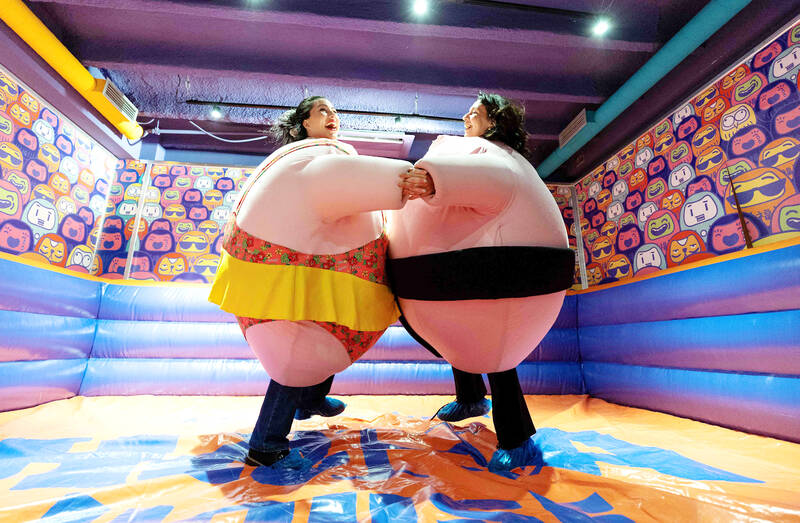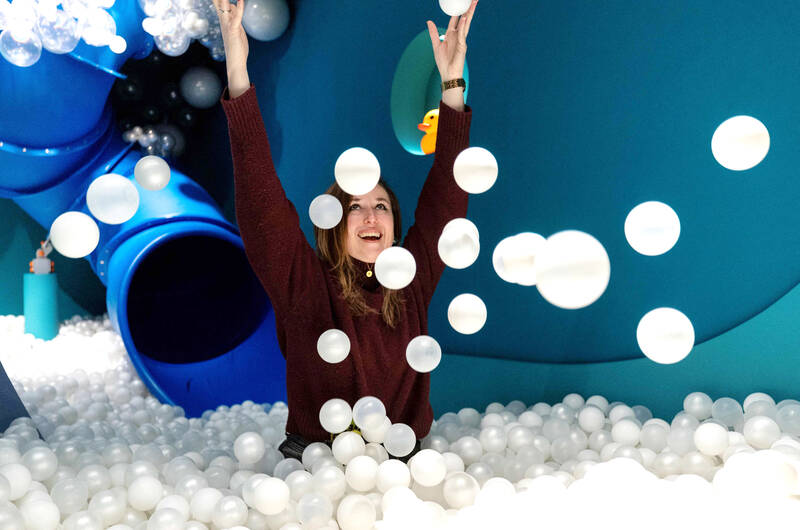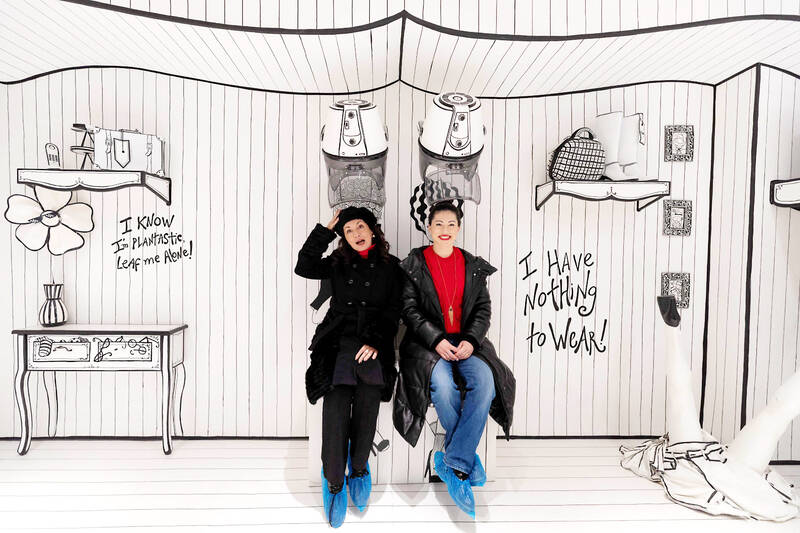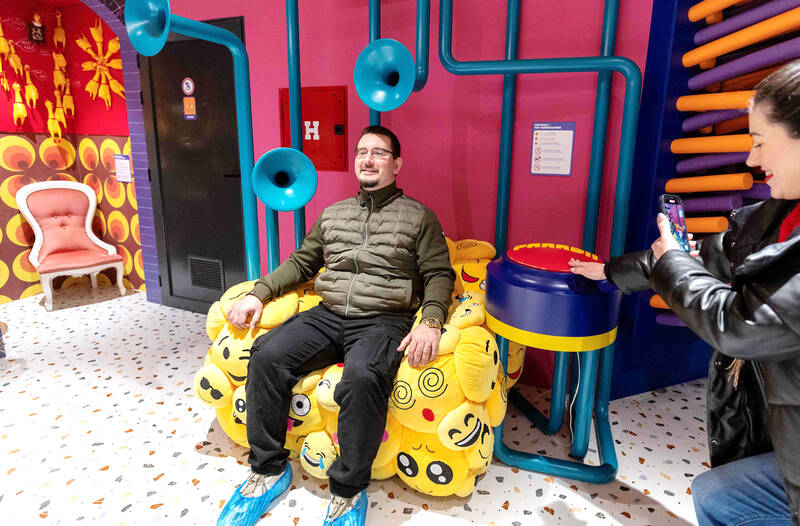A new museum of laughter is offering to put people through the spinner to wash away the negativity of modern life.
Visitors to the HaHaHouse in the Croatian capital Zagreb are blasted with a puff of white smoke once they step inside to blow away their worries before climbing into a “giant washing machine.”
The “centrifuge of life” then whips them away Willy Wonka-style down a twisting slide into a pool filled with little white balls where their journey to a happier place starts.

Photo: AFP
Its creator Andrea Golubic said she had the idea for the museum during the pandemic when many were feeling down, depressed and isolated.
“I realized that I had a mission — to heal people with laughter,” added the upbeat 43-year-old.
The idea “came straight from the heart,” Golubic said, “and on that very day I listed 78 exhibits... that’s how the HaHaHouse began.”

Photo: AFP
Golubic said it was her carefree seven-year-old self that inspired her — “a picture of me as a first-grader, with wide teeth and dying of laughter. I was constantly joking as a kid,” she said.
Visitors press a button to be “disinfected from negativity” as soon as they step inside the museum, which has eight interactive zones.
One has a rubber chicken choir cheerfully cackling out hits like ABBA’s Dancing Queen, there is a karaoke room with distorted voices and a “Sumo Arena” for wrestling in puffed up costumes.

Photo: AFP
There is also some serious history of humor from ancient to modern times told through theater, film and the Internet. The museum also explains humor styles, from word play, slapstick, toilet and dark humor to satire with the help of some choice one-liners.
“I’ve had so much plastic surgery, when I die they will donate my body to Tupperware,” is one of the featured zingers from US comedian Joan Rivers.
‘INNER CHILD’

Photo: AFP
Golubic said the HaHaHouse is drawing everyone from small children to the elderly, with grown-ups seeing it as a good excuse to play at being kids again themselves.
“All those who still feel a bit of childish joy and embrace their inner child, will recharge themselves,” she insisted.
Pensioner Bruno Dadic said he was “delighted” by his visit “as there is never enough humor in life.
“Laughter is a medicine for the soul,” he said.
Zagreb’s psychiatric hospital has voiced interest in organized visits and links are also being made with schools and retirement homes.
“The museum is great,” said Aleksandar Suka who celebrated his fifth birthday with a visit. Accompanied by his mother, the little boy said he loved lying on the “Bed of Nails” since they tickled him. Singer Zorica Bucic, from the coastal town of Split, said the museum was perfect for our times “when we are bombarded with so much bad news.
“Entering here is like entering childhood, being relieved of all problems. If you could come here more there would be no need to pay a psychologist,” she said.
Indeed, laughter is a defence mechanism which gives people strength to face their problems, psychologist Petar Kraljevic said, adding he loved the idea too.
“If a prescription for three hours of laughter per 24 hours could be written and followed that would certainly give positive results.”

Nine Taiwanese nervously stand on an observation platform at Tokyo’s Haneda International Airport. It’s 9:20am on March 27, 1968, and they are awaiting the arrival of Liu Wen-ching (柳文卿), who is about to be deported back to Taiwan where he faces possible execution for his independence activities. As he is removed from a minibus, a tenth activist, Dai Tian-chao (戴天昭), jumps out of his hiding place and attacks the immigration officials — the nine other activists in tow — while urging Liu to make a run for it. But he’s pinned to the ground. Amid the commotion, Liu tries to

The slashing of the government’s proposed budget by the two China-aligned parties in the legislature, the Chinese Nationalist Party (KMT) and Taiwan People’s Party (TPP), has apparently resulted in blowback from the US. On the recent junket to US President Donald Trump’s inauguration, KMT legislators reported that they were confronted by US officials and congressmen angered at the cuts to the defense budget. The United Daily News (UDN), the longtime KMT party paper, now KMT-aligned media, responded to US anger by blaming the foreign media. Its regular column, the Cold Eye Collection (冷眼集), attacked the international media last month in

A pig’s head sits atop a shelf, tufts of blonde hair sprouting from its taut scalp. Opposite, its chalky, wrinkled heart glows red in a bubbling vat of liquid, locks of thick dark hair and teeth scattered below. A giant screen shows the pig draped in a hospital gown. Is it dead? A surgeon inserts human teeth implants, then hair implants — beautifying the horrifyingly human-like animal. Chang Chen-shen (張辰申) calls Incarnation Project: Deviation Lovers “a satirical self-criticism, a critique on the fact that throughout our lives we’ve been instilled with ideas and things that don’t belong to us.” Chang

Feb. 10 to Feb. 16 More than three decades after penning the iconic High Green Mountains (高山青), a frail Teng Yu-ping (鄧禹平) finally visited the verdant peaks and blue streams of Alishan described in the lyrics. Often mistaken as an indigenous folk song, it was actually created in 1949 by Chinese filmmakers while shooting a scene for the movie Happenings in Alishan (阿里山風雲) in Taipei’s Beitou District (北投), recounts director Chang Ying (張英) in the 1999 book, Chang Ying’s Contributions to Taiwanese Cinema and Theater (打鑼三響包得行: 張英對台灣影劇的貢獻). The team was meant to return to China after filming, but